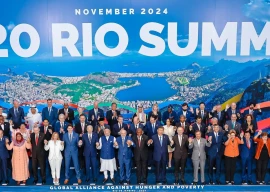
First, that today’s young voters “want leaders who are decisive about their stands and the policies that will benefit the people and do not hesitate to roll out such policies”.
Second (referring to the academics consulting Sonia Gandhi), that “weak leadership at various levels has given rise to a bunch of pseudo-activists who have no connect with ground reality”.
Third, that Indira Gandhi would never have stood for such things: “She was strong and decisive. She took bold decisions, such as nationalisation of banks or ending privy purses, which she implemented with conviction and firmness.”
Let’s try and look at Pawar’s view from a critical perspective. First, his description of a ‘decisive leader’ indicates someone who is full of certitude. Such a leader is not usually mindful of the dissenting view and “does not hesitate to roll out” the policies he thinks will lead to benefit. But what if there is merit in the dissent?

It is difficult to understand what is so good then about such a decisive leader. The youth might well want quick solutions, but is it possible that they don’t exist?
Pawar refers to ‘pseudo activists’, presumably meaning people like Aruna Roy, but it is because of them that India has legislated outstanding laws like the Right to Information and the Right to Education and the Food Security Bill. It is difficult to see why their influence on government is a bad thing. And Pawar doesn’t illuminate us on this other than to tell us that he finds them ridiculous.
His example of a decisive leader, who didn’t pay heed to people unconnected to politics and its realities, is historically incorrect. Indira was advised by people like Inder Kumar Gujral and Romesh Thapar who had little connect with the grass roots. They were called her Kitchen Cabinet. In her later years, she was even advised by her unhinged son Sanjay, who failed in high school and had no education, and his gang of friends.
Her decision to nationalise all of India’s banks may have been made with firmness but was it the right thing to do? That is debatable.
The Privy Purses were something on which Sardar Patel gave his solemn word to the princely states that acceded to India. Was it such a good thing for India to violate Vallabhbhai’s contract inside 25 years? Again, this is debatable.
Strangely, Pawar then argues against himself by saying that the voters may not have necessarily done the right thing and Delhi’s revolutionary voters were hypocrites: “On one hand, the same class of people are responding and voting for the Aam Admi Party’s (AAP) call for a corruption-free Delhi and on the other hand, they are demanding that their illegal colonies be legalised. You will find such contradictions in Delhi.”
He also says that the AAP’s promises to bring down the price of onions are bogus because the state government isn’t in control of such things.
So, here’s an instance of a decisive leader making a reckless promise he cannot keep.
The fact is that wise leadership is usually cautious, unlike Pawar’s fantastic decisive leader. Wise leadership is conservative in the true sense of the word. That is to say, it is realist. The voter, especially the young one, is inclined to blame the state for his problems but it is hardly the case that the state and its decisive leader can solve all of them, according to Pawar’s own reckoning.
Published in The Express Tribune, December 15th, 2013.
Like Opinion & Editorial on Facebook, follow @ETOpEd on Twitter to receive all updates on all our daily pieces.
COMMENTS (16)
Comments are moderated and generally will be posted if they are on-topic and not abusive.
For more information, please see our Comments FAQ

















This is what I have heard from many government employees in India many years ago about Sharad Pawar, who has a reputation like no one else when it comes to corruption.
If any file comes to his desk for his approval, he would write a note on the left margin of the document "Not Approved", sign it and leave the document sitting on his desk. Writing your comment on the left margin of the document is a common practice followed by most government officials in India.Those interested in getting his approval will then meet with him personally at his office and if Sharad Pawar gets what he wants, he would add an "e" at the end of the word "Not". His initial declining note "Not Approved" will then become "Note Approved". This one letter "e" has so much value.
by analysing above article I came to conclusion narendra modi is the only leader of present time for India. ..
Now that the election of Modi to power is somewhat a sure reality, pseudo secular liberals like Akbar Patel are looking for decisive leader. He misses the point. Modi has increased his odds only because he is decisive leader and a large part of the Indian population see that reality. Sorry Patel, paclk you bags and move to Pakistan where minorities live in paradise.
This author is drifting... unsure in which direction the political winds are blowing... So now we have him lord over Pawar's analysis... Hardly any Pakistani would have heard about Pawar, who we know here very well in Maharashtra.. For starters he's the most opportunist, corrupt politician we've ever had.... A regular fence-seater and a spineless crook...who's shamelessly endured slapgate (one of Anna's followers slapped him a couple of years back). He has bought all the journos..
The way I see it is... Officially he's with the UPA (and bearing their insults stoically) but internally he has teamed up with Modi.. No other way, since he has not future outside a few districts in Western Maharashtra...He's having a foot in either camps to make sure he's not out of power, regardless of the political dispensation in Delhi.. And Aakar Patel is making him larger than life by penning a column in ET on him (Did I say Pawar bought journos??)...
You have not mentioned that what types of decisions the Indian youth expect from their leaders.? Has ever decisive leader brought change in Indian society, how much?
indecision is often worse than bad decision.
So, the author's ultimate conclusion is that it is better to have a weak leadership which is not willing to take any tough decisions and there by end the country into confusion....
Very Good!! No matter what the world says 'Yes Madamji' is my naara....
running with UPA hares and hunting with NDA hounds.this tribe is getting quiet large Pawar,Maya,Mulayam,Farukh et al. but now the voter can see through their gimmicks and seems to be saying ''AAP jaisa koi meri jindagi mein aaye to baat ban jaaye''.Good write. It is absolutely true that merely the style of making quick decisions just for the sake of looking decisive can never make of a person a good leader, let alone a great leader. It is rather a leader's ability to make right decisions that separates him from the failed ones. Making right decisions is a well known scientific process comprising of various stages and steps which all take their due time. There is simply no short cut.
Regarding your this question, "The Privy Purses were something on which Sardar Patel gave his solemn word to the princely states that acceded to India. Was it such a good thing for India to violate Vallabhbhai’s contract inside 25 years?". You have to be quite shameless and strong to absorb such socks of India's dishonorable and low acts, else you might end up in an ICU of some coronary ward, because there is a very long list of India's acts of deceiving and violating promises and pledges. Be that the backtracking from the pledges given to Kashmiri people on their right to plebiscite, or be that the promises made on not using the materials given and the knowledge acquired from the atomic reactors given for only peaceful purposes towards nuclear weapons and military use.
Well, Pakistan had a string of decisive leaders in Ayub, Bhutto, Zia and Musharraf. It was only under a indecisive leader like Zardari that Pakistan saw a smooth transition of government. It was the faceless Deng under whom China rose not decisive Mao, Russia is still to get out of Stalin's shadow. And Germany out of Hitler's. The last decisive leader US had was Lincoln. It was under the faceless English that the common Indian progressed more than Ashoka or Akbar. Pity the country that requires decisive leaders. It only means that people are cowards, do not want to take hard decisions themselves.
Paw air is allegedly among the most corrupt politicians and is also a disgruntled one. He wants to become the Prime Minister and suddenly has found wisdom. He should not be trusted there is always an angle to his utterings.
India can have a decisive leader if Mr Akar Ahmad Patel is portrayed as Congress' Prime Minister candidate in 2014. Mr. Akar Ahmad Patel Ki Jai Ho!!!
Its quite amazing that something like this gets put up on a Pakistani site...... to me this was double Dutch and most uninteresting.